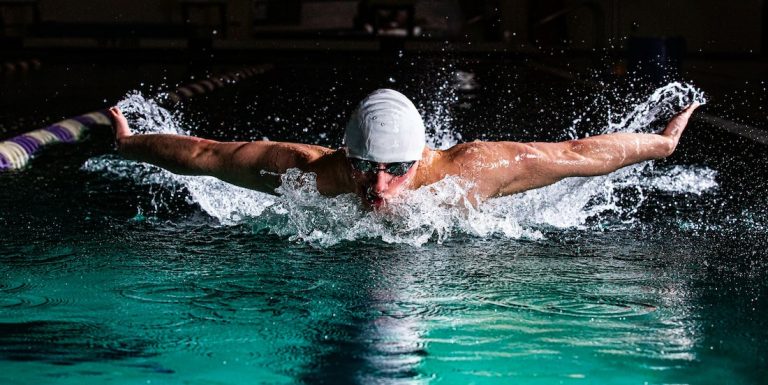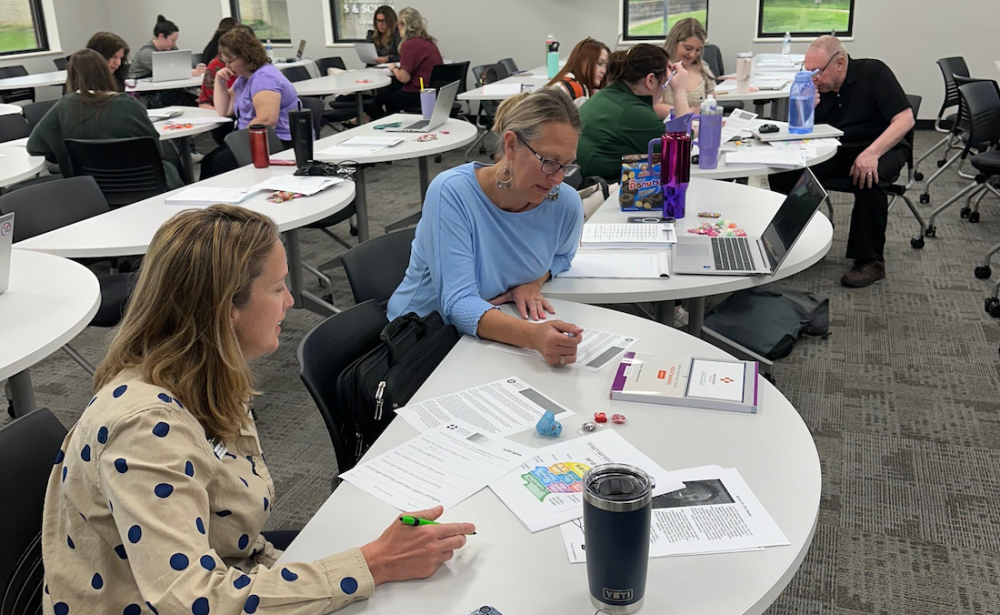
National Swimmer Craig Inspires with Powerful Recovery Story at WSCO, an Appalachian College
Marietta, Ohio — The Mental Health training at Washington State College of Ohio (WSCO) fell silent as Cameron Craig, a competitive swimmer from Springfield, Missouri, took the stage. His message was raw, unfiltered, and deeply personal: a story of childhood trauma, addiction, and hard-won redemption.

The event, coordinated by Dr. Bill Bauer and Dean Kathy Temple-Miller, aimed to bridge gaps in understanding mental health and recovery, using Craig’s life as a roadmap for hope.
— From the Pool to the Podium —
His message was raw, unfiltered, and deeply personal: a story
of childhood trauma, addiction, and hard-won redemption.

Adverse Childhood Experiences:
The Foundation of Struggle
Craig’s early years were marked by instability. He detailed how adverse childhood experiences (ACEs)—including family dysfunction and emotional neglect—shaped his trajectory.
“I learned to swim to escape,” he told the audience, drawing parallels between the discipline of athletics and the chaos of his youth.
Research shows ACEs correlate with higher risks of substance abuse, a pattern Craig would later confront. His honesty resonated with the attendees, many of whom nodded in recognition.
The Depths of Addiction and the
The Climb to Recovery
Craig’s athletic prowess masked his inner turmoil. By college, he was battling alcohol and drug addiction.
“I used substances to numb the pain, but they only amplified it,” he admitted. His turning point came after a near-fatal overdose, a moment he described as “hitting rock bottom to find a foundation.”
Craig emphasized the role of support systems—therapists, mentors, and peers—in his recovery.

WSCO’s Role in Fostering Dialogue
The college’s initiative to host Craig aligns with its broader mission. “Student success isn’t just academic; it’s holistic,” said Dean Temple-Miller. WSCO’s small class sizes and tailored support programs, such as counseling services and workforce development, provide scaffolding for students facing similar challenges. Dr. Bauer added, “Craig’s story underscores why we prioritize mental health resources—it saves lives.”
Audience Reactions and Takeaways

Attendees left with actionable insights. “His talk made me realize recovery isn’t linear,” said one faculty member.
Others praised Craig’s refusal to sugarcoat struggles, a contrast to the curated perfection often seen on social media.
His reference to Remember the Titans—a film about unity amid adversity—drew applause, reinforcing his theme of collective healing.

Why This Matters
Craig’s visit is part of WSCO’s push to address Ohio’s opioid crisis and mental health gaps.
With addiction rates rising statewide, his story offers a blueprint for resilience. It is widely known that public figures sharing their journeys can destigmatize addiction and encourage others to seek help.
Looking Ahead
WSCO plans to expand its speaker series, with future events focusing on trauma-informed care.
Craig, now a recovery advocate, hopes his transparency will spark change. “If one person leaves here today and asks for help, that’s a win,” he said.
For more on WSCO’s programs, visit wsco.edu.

Questions for Cameron Craig (National Swimmer):
You described swimming as an escape from childhood adversity. How did the discipline of athletics later shape your approach to recovery?
“Swimming held me responsible in terms of holding myself accountable. If I wanted to succeed I had to be in the present. Moving forward with mental health I would like the ability to give more notice to suicide awareness as my main platform.”
In your talk, you mentioned ‘rock bottom’ as a foundation. What specific moment or person made you commit to sobriety, and how did you sustain it?
“Rock bottom refers to those who have attempted suicide, I was the fortunate one who survived it. I think one of the most impactful ones was a University of Michigan swimmer named Ian.”
What’s one misconception about addiction you hope your story helps correct, especially for young adults?
“I wouldn’t exactly word is as a misconception but when people start to look for an outlet that isn’t sport related it can lead to addiction.”

Questions for Dr. Bill Bauer (Program Coordinator):
Why was Cameron’s story uniquely suited for WSCO’s student body, and how does it align with the college’s broader goals?
“It’s not only suited for WSCO, but it is suited for all individuals. Mental health should be a priority for all individuals. Unfortunately we still have a huge amount of stigma regarding mental health treatment.”
What tangible resources (e.g., counseling, workshops) does WSCO offer students battling addiction or ACEs, and how can they access them?
“Participants at this workshop were all certified in Mental Mental Health First Aid. This three-year certification allows participants to be first responders in case of a mental health first aid crisis. I’m proud to have certified them.”
Questions for Dean Kathy Temple-Miller:
You’ve said WSCO’s ‘focus is on student success.’ How does addressing trauma and addiction fit into that mission academically and culturally?
“As an open-access institution, Washington State College of Ohio is committed to meeting students where they are—academically and personally. Addressing trauma and addiction aligns with our mission to support every individual rewriting their story. Through no-cost mental health services, holistic and basic needs support, and free tutoring, we help students heal, grow, and succeed.”
Small class sizes are a WSCO hallmark. How does this intimacy help faculty identify and support students in crisis?
“At Washington State College of Ohio, our small class sizes create space for deep, meaningful connections between students and faculty. That intimacy allows instructors—and our dedicated student success coaches—to notice when a student is struggling and intervene early. What truly sets WSCO apart is that everyone on campus, from the facilities team to the faculty, plays a role in supporting our students—walking beside them through their darkest days and celebrating their milestones.”
What’s your vision for expanding mental health programming, and how can communities like Marietta collaborate?
“Students often open up to a peer before seeking professional help, which is why expanding mental health programming at WSCO includes a vision for offering Mental Health First Aid training directly to students. We know it takes an entire campus—and that includes empowering students themselves—to support mental well-being. With strong community partnerships, like those seen in the recent P.S. I Love You event, we hope to deepen collaboration across Marietta and the region. Together, we can create a culture of care where every student feels seen, supported, and equipped to help others.”
If you’re struggling, it’s okay to share your feelings.
Help is available – speak with someone today.
988 Suicide and Crisis Lifeline | Languages: English, Spanish | Hours: Available 24 hours
The Bauer Fund of the J. Luce Foundation supports suicide prevention initiatives for young adults

Swimmer’s Journey of Resilience Captivates Washington State College (May 2, 2025)